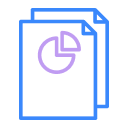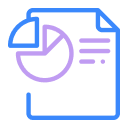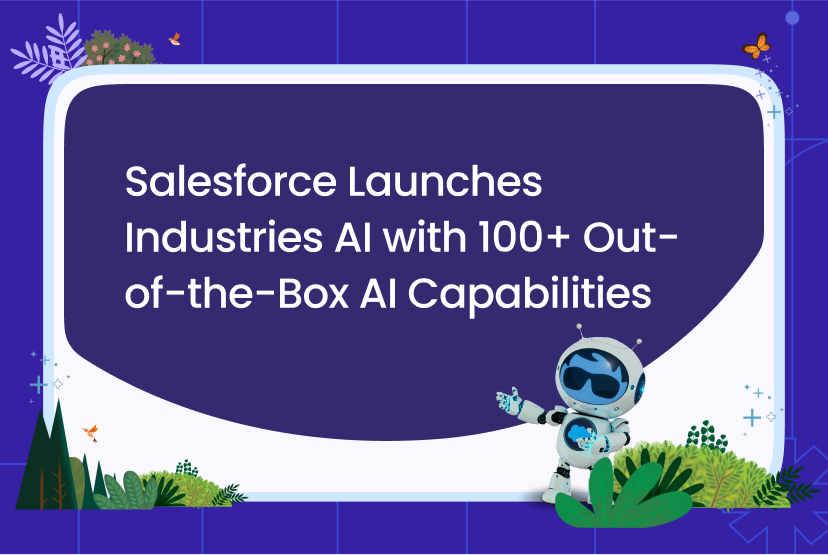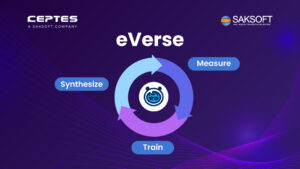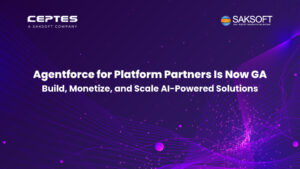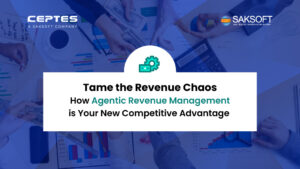Let’s Dive Deeper:
Embedded into every Salesforce industry cloud, Industries AI offers sector-specific prompts, AI capabilities, and data models to address unique challenges within industries. Powered by Data Cloud and supported by the Einstein Trust Layer, Salesforce has ensured security and trust. The aim is to provide tailored AI-driven solutions that streamline tasks across different sectors enhancing efficiency and customer experience with powerful AI features. In short, it helps customers to deploy ready-to-use AI solutions to automate time-consuming, repetitive tasks.
Along with that, Salesforce created the AI Use Case Library featuring more than 100 AI Capabilities across industries and dedicated use case libraries with resources on how to get started. The Use Case Library will be regularly updated with new features and capabilities.
Why is it important?
Today business leaders fear missing out on the AI revolution if they don’t deploy it soon. In the last six months alone, urgency to deploy AI has surged by 700%. However, building and training AI models can be prohibitively expensive for most businesses. Additionally, each industry has unique needs, challenges, and goals for AI to address. For AI to truly deliver value, organizations need industry-specific capabilities that can meet their distinct requirements and Industries AI is capable of serving that purpose.
Industry-Specific AI capabilities:
Industries AI will work as the foundation for industry-specific Agentforce agents, revolutionizing workflows across every role at scale. Coming soon to every industry cloud, these agents can be set up in minutes, operate autonomously 24/7, and handle sector-specific tasks. They leverage an organization’s CRM data, external data, and metadata while ensuring privacy and security. When cases become complex, agents can seamlessly assign the task to human representatives with complete context, improving efficiency and decision-making. This blend of AI and human collaboration ensures streamlined operations across industries.
Financial Services:
AI automates complaint summaries, helping banks quickly resolve issues by analyzing case history, like unstructured call logs and emails. For instance, if a customer raises a concern regarding disputed fees, AI can quickly access the customer’s case history and create a summary for faster resolution.
Life Sciences:
AI assists in clinical trial recruitment by matching patients using both structured and unstructured data, such as diagnosis codes, medication details and demographics, cutting down on trial candidate selection time.
Healthcare:
AI enhances patient services by generating pre-visit recaps, helping coordinators access patient care plans and quickly validate insurance benefits, speeding up care delivery.
Automotive:
AI monitors vehicle telemetry, generating performance summaries. For example, it can detect engine issues and alert customers to schedule maintenance before breakdowns.
Public Sector:
AI simplifies case management by providing a complete history of benefits applications and identifying changes that could impact eligibility, enabling quicker decisions.
Consumer Goods:
AI helps supervisors manage truck inventory by identifying causes of deviations, such as damaged goods, ensuring better control over delivery processes.
Energy & Utilities:
AI analyzes billing history and usage patterns, helping customer service agents resolve billing inquiries faster and advise customers on cost-saving measures.
Manufacturing:
Artificial Intelligence in Manufacturing provides asset service summaries by analyzing equipment age, warranty status, and past repairs. This helps agents recommend maintenance and extended warranties to boost revenue.
Education:
AI streamlines student recruitment by automating responses to inquiries about programs and deadlines, helping universities engage prospects more efficiently.
Nonprofit:
AI generates case summaries for program participants, enabling caseworkers to better understand individual needs and provide more tailored care.
Net Zero:
AI simplifies ESG reporting by suggesting responses aligned with disclosure frameworks and improving report accuracy through tone and phrasing evaluations.
Communications:
AI enables sales reps to quickly generate multi-site quotes by analyzing customer-specific data like number of employees and usage patterns. For instance, if a telecom company is providing internet services to a chain of restaurants, AI can recommend the best bandwidth package for each location based on their employee count and expected usage. The sales rep can customize the quote accordingly for faster closure.
Media & Entertainment:
Generative AI speeds up the RFP process by extracting key proposal details like budget and timeline, allowing sales teams to respond faster without manual sorting.
Wrapping Up:
As per Salesforce, Industries AI is a powerful and practical tool to empower individuals in every industry to derive tangible value from AI right now. Even small and medium sized companies can dare to dream about deploying AI to solve their specific industry challenges.
AI capabilities tailored for each industry will be accessible through their respective industry clouds. Most features will be available by October 2024 and February 2025, with additional capabilities being introduced in Salesforce’s three annual releases.
Businesses are about to transform their operations with Agentforce. Discuss your specific business needs with our Data & AI experts and discover how Agentforce can revolutionize your customer engagement and support strategies. Drop a mail at contact@ceptes.com.
FAQs:
1. How does the integration with Data Cloud impact the AI capabilities of Service Cloud?
2. How does Salesforce's AI-powered Service Cloud integrate with existing systems?
3. What is the expected timeline for the availability of these new functionalities?
- Service Planner is expected to be in pilot in October 2024.
- Customer Experience (CX) Intelligence will be generally available in November 2024.
- The Employee Service Self-Service Portal, HR Service Console, and Workday integration will be generally available in October 2024.
- Employee Service Agent will be generally available in 2025.

Nilamani Das
Nilamani is a thought leader who champions the integration of AI, Data, CRM and Trust to craft impactful marketing strategies. He carries 25+ years of expertise in the technology industry with expertise in Go-to-Market Strategy, Marketing, Digital Transformation, Vision Development and Business Innovation.









